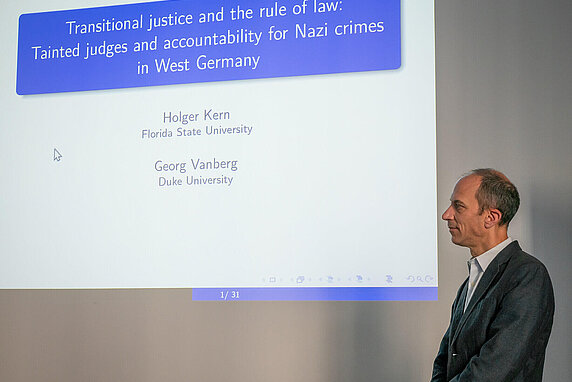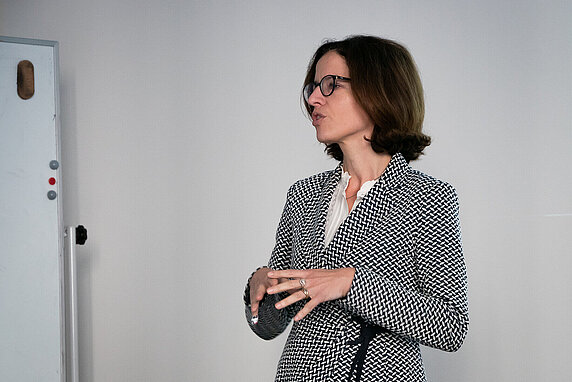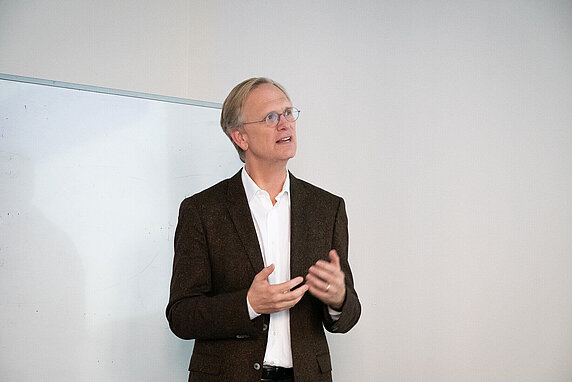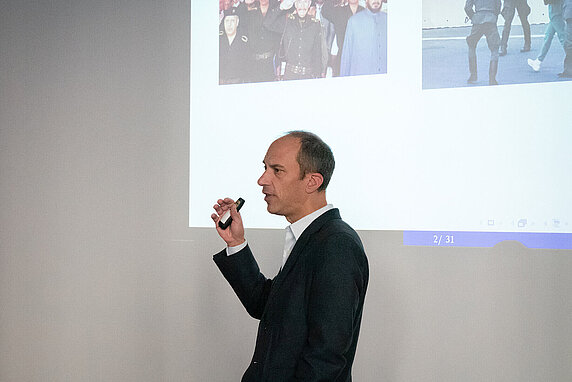Georg Vanberg and Mark Hallerberg discussed the impact of tainted judges in the West German judiciary.
After the transition from an authoritarian regime, do former collaborators serving in official functions support or undermine a new democratic system? Georg Vanberg, Senior Associate Dean for Faculty Development and Ernestine Friedl Professor of Political Science in the Department of Political Science at Duke University, explored this question in a keynote lecture at the Hertie School on 4 October. The fifth event in the series Understanding the politics and policies of exclusion (see below) focused on the legacy of judges in the post-war West German judiciary with links to the Nazi regime. Mark Hallerberg, Professor of Public Management and Political Economy at the Hertie School, moderated the discussion.
President Cornelia Woll kicked off the event with opening remarks underlining the importance of the series: “Understanding how legacies shape informal institutions and implicit biases allows us to address some of the things that you might not see as visibly as laws and organisations but still weigh heavily on the present.”
Mark Hallerberg also highlighted the relevance of Vanberg’s research for the present day. “Despite its reflection on history, this is still an up-to-date theme that needs to be addressed and will remain relevant for research on international relations,” he said.
Tainted judges ruled differently in systematic ways than judges who had no ties to the former regime
The results of Vanberg’s research, carried out with Holger L. Kern of Florida State University, showed that in the early West German judiciary, when the judges completed their legal education did in fact affect their rulings. Judges trained prior to 1933 convicted defendants of Nazi crimes twice as often as tainted judges who were educated during the Third Reich and even judges trained after 1945, according to the researchers. On whether and to what extent to include those with ties to the former regime in the new one, Vanberg said that “there may be circumstances where you have to make a deal with the devil” because of a lack of qualified personnel. However, the presence of tainted judges in the West German judiciary did significantly undermine efforts to seek justice for Nazi crimes, he added.
The study considered more than 200 trials between 1952 and 1964. The authors conducted a statistical analysis of the share of judges in each court, as they only knew which judges were assigned to which court, and not which trials they sat on. They specifically defined tainted judges as those who trained during the Nazi period. “If someone chose to go into law in this period, they likely chose to become entangled with the regime,” said Vanberg. Not every conviction counted either, since the authors only considered convictions if the judges imposed a prison sentence, and many did not.
In the ensuing Q&A session, Vanberg mentioned that the Nazis also faced problems filling judiciary positions with those who shared their ideology, and that they sometimes solved this by putting “politically unreliable” individuals in positions where they could not “cause trouble”. When asked why judges trained before 1933 were less lenient in Nazi trials, he speculated that the higher number of convictions might have been due to a possible “law and order mentality” among older judges who frowned upon Nazi vigilantism in the last days of the war.
Find a recording of the event here.
About the event series
Understanding today also means learning from our past. The rise of right wing movements across the globe, increasing polarisation and an alarming increase in anti-Semitism across Europe require us to look at the past and understand the politics and policies of exclusion we continue to witness today – and what we can do as stewards of good governance to combat against them.
In November 2020, the Hertie Foundation commissioned the Gesellschaft für Unternehmensgeschichte to conduct a comprehensive study on the history of its assets. The independent study will be conducted Dr. Johannes Bähr and PD Dr. Ingo Köhler with a focus on the period from 1933 and will be published as a book-length project by the end of 2022.
As the work of Dr. Bähr and Dr. Köhler progresses, we would like to invite members of our community to explore the politics and policies of exclusion both in a historical and contemporary context.
Find more information on the event series here.




